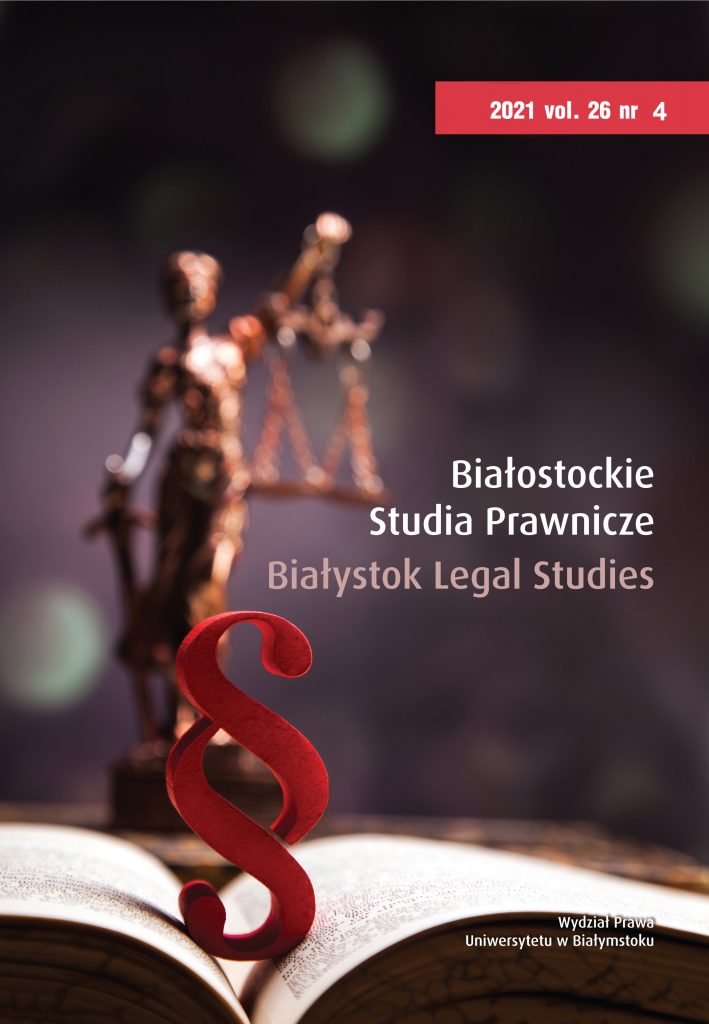On Evidence Preclusion in Tax and Control Procedures: a Comparative Legal Approach
Słowa kluczowe:
comparative law research, evidence in tax proceedings, evidence preclusion, tax audits, tax proceedingsAbstrakt
In the framework of tax collection procedures in different legal orders, various mechanisms may be introduced aiming at the implementation of the economy and the promptness of proceedings, which are aimed at observing the rule of evidence material concentration. One of the ways of securing it is the institution of so-called evidence preclusion, which constitutes a certain limitation on the possibility of referring to new evidence due to the stage of particular proceedings. The objective of the paper is to establish whether the institution of evidence preclusion in the tax procedure is necessary. One should search for the clues to answer the question presented through comparative legal studies. Implementing such a complex aim of research, we analysed legal regulations connected with the concentration of evidence material in selected states. So far, this question has not been a subject of a separate analysis. The results of the studies demonstrated that in the legal orders under analysis there are solutions, the aim of which is, to prevent lengthy proceedings and seeking that the resolution occur in the shortest possible time; if possible, without any harm for the actual and legal clarifying the matter. Evidence preclusion cannot be used by tax authorities as an instrument limiting the taxpayer’s right to a fair tax process.Bibliografia
Adamiak B., Europeizacja prawa postępowania administracyjnego, (in:) Z. Janku, Z. Leoński, M. Szewczyk, M. Waligórski, K. Wojtczak (eds.), Europeizacja polskiego prawa administracyjnego, Wrocław 2005.
Alink M., van Kommer V., Handbook on Tax Administration, Amsterdam 2011.
Babčák V., Daňove právo procesne. Košice 2000.
Birk D., Tax Protection Procedure in Germany, (in:) D. Albregtse, H. van Arendonk, Taxpayer Protection in the European Union, The Hague-London-Boston 1998.
Blahova R., Jakubec M., (in:) M. Lang, P. Pistone, J. Schuch, C. Staringer (eds.), Procedural Rules in Tax Law in the Context of European Union and Domestic Law, Kluwer Law International 2010.
Chróścielewski, W., Słowacja, (in:) Z. Kmieciak (ed.) Postępowanie administracyjne w Europie, Wolters Kluwer 2010.
Council of Europe Handbook, Principles of Administrative Law Concerning the Relations Between Administrative Authorities and Private Persons, Strasbourg 1996.
Czudek D., Nowa ustawa Ordynacja podatkowa w Republice Czeskiej z ukierunkowaniem na problematykę udzielania i dostępu do informacji w administracji podatkowej, (in:) A. Dobczyńska, E. Juchniewicz, T. Sowiński (eds.), Daniny Publiczne. Prawo finansowe wobec wyzwań XXI wieku, CeDeWu 2010.
de Boer Th.M., Uitgangspunten van een rechtsvergelijkende theorieL een paradigma voor de lage landen, Nijmegen 1994.
Dragos D.C., Neamtu B. (eds.), Alternative Dispute Resolution in European Administrative Law, Berlin 2014.10.1007/978-3-642-34946-1
Kamerling R.N.J. (ed.), The International Guide to Tax Auditing t. 1. Amsterdam: International Bureau of Fiscal Documentation 2011.
Klein F., Rätke, B., Abgabenordnung. Kommentar, C.H. Beck 2020.
Kmieciak Z., Postępowanie administracyjne w świetle standardów europejskich. Warsaw 1997.
Kmieciak Z., Zasada autonomii proceduralnej państw członkowskich Unii Europejskiej i jej konsekwencje dla procesu orzekania przez sądy administracyjne i organy administracji publicznej, „Zeszyty Naukowe Sądownictwa Administracyjnego” 2009, no. 2.
Kmieciak Z., Zarys teorii postępowania administracyjnego, Warsaw 2014.
Kmieciak Z. (ed.), Postępowanie administracyjne w Europie, Warsaw 2010.
Kmieciak Z., Wróbel A., Biernat S., Przystąpienie Rzeczpospolitej Polskiej do Unii Europejskiej: Wyzwanie dla organów stosujących prawo, (in:) B. Dolnicki, J. Jagoda (eds.), Prawo polskie a prawo Unii Europejskiej, Warsaw 2003.
Krabbe H., Legal Remedies in the German Tax System, “European Taxation” 2009, no. 9.
Kubiak A., (in:) Z. Kmieciak, (ed.) Postępowanie administracyjne w Europie, Warsaw2010.
Lehis L., Means Ensuring Protection of Taxpayer’s Right in Estonian Tax Law, “Juridica International” 1999, no. 4.
Merusk K., Administrative Law Reform in Estonia: Legal Policy Choices and Their Implementation, “Juridica International” 2004.
Albin T., Herm M., Klauson I., Uustalu E., (in:) M. Lang, P. Pistone, J. Schuch, C. Staringer (eds.), Procedural Rules in Tax Law in the Context of European Union and Domestic Law, Kluwer Law International 2010.
Morawski L., Argumentacje, racjonalność prawa i postępowanie dowodowe, Toruń 1988.
Reimer E., National Report on Taxpayer Protection in Germany, (in:) W. Nykiel, M. Sęk (eds.). Protection of Taxpayer’s Rights: European, International and Domestic, Warsaw 2009.
Seer R., Durchführung des Rechtsbehelfsverfahrens, (in:) K. Tipke, J. Lang (eds.), Steuerrecht, Köln 2005.
Seer R., (in:) G. Meussen (ed.), The Burden of proof in tax law, EATLP Congress, Uppsala, 2–3 June 2011.
Skóra A., (in:) Z. Kmieciak (ed.) Postępowanie administracyjne w Europie, Warsaw 2010.
Thuronyi V., Comparative Tax Law, Hague: Kluwer Law International 2003.
Wróbel A., Wpływ prawa europejskiego na prawo o postępowaniu administracyjnym, (in:) B. Dolnicki, J. Jagoda (eds.), Administracja pod wpływem prawa europejskiego, Bydgoszcz-Katowice 2006.
Zweigert K., Kotz H., Introduction to Comparative Law, New York 1998.



